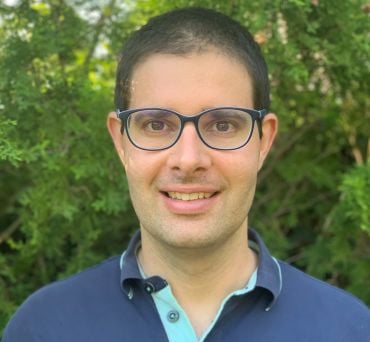
ERC Consolidator Grants are highly competitive; this year 328 proposals were selected from 2313 applications: a success rate of 14.2%. Each of the Oxford recipients will receive up to €2 million over five years.
Professor James Naismith , Head of the Mathematical, Physical and Life Sciences (MPLS) Division, said: ‘These awards highlight the exceptional talent and creativity of our researchers here at Oxford. Securing ERC Consolidator Grants is a remarkable achievement, reflecting not only the innovative nature of their work but also the global significance of the research conducted across MPLS. I am delighted to see our researchers receive this support to push the boundaries of knowledge and tackle some of the most challenging questions in science today.’
About the Oxford recipients:
Professor Dawid Kielak
, a researcher of Pure Maths at Oxford’s Mathematical Institute.
Professor Kielak works in Geometric Group Theory, an area on the intersection of Algebra, Geometry, and Topology. He is particularly interested in the notion of “fibring”, the concept that a complex space may be understood as a simpler, lower dimensional structure changing over time. An example of this is space-time: a four-dimensional universe that can be viewed as a three-dimensional space evolving in time.
I am very humbled to have received this ERC Consolidator Grant. It will allow me to build a group dedicated to the study of fibring, and other problems, in the setting of high-dimensional hyperbolic manifolds and related objects.
Professor Dawid Kielak, Mathematical Institute
‘It turns out that the symmetries of the “universe” we are studying can reveal a lot about potential fibrings’ Professor Kielak said. ‘I am looking for situations where these symmetries provide a complete picture as to whether fibring is possible. Using this grant, I aim to demonstrate that “negatively curved universes” (hyperbolic manifolds) with an odd number of dimensions always admit fibring, if small adjustments are made. This property is already known to hold for three-dimensional manifolds, and I will investigate how it extends to higher dimensions.
Associate Professor Matthew Langton , a researcher of Inorganic Chemistry, Department of Chemistry.
 Associate Professor Matthew Langton.
Associate Professor Matthew Langton.Professor Langton will use the ERC Consolidator Grant to develop artificial molecular machines that work within cell membranes to control transmembrane transport and catalyse reactions. Molecular machines are molecules which perform specific tasks by harnessing controlled mechanical movements at the nanoscale, and lie at the heart of many key biological processes. The RELAYMACHINE project will explore how to develop analogous artificial molecular machines using chemical synthesis. These include molecular machines which function as nanoscale relays to actively pass ions across cell membranes.
‘This ERC Consolidator Grant will enable my team and I to explore the potential of artificial molecular machines in biological membranes, which is where many of their natural counterparts operate’ Professor Langton said. ‘We are excited by the prospects of developing new applications for nanotechnology and medicine, such as novel chemical tools for drug delivery or nanoscale synthesis.’
‘I am extremely grateful to the ERC for funding this project, to my mentors and collaborators for their support, and to my past and present group members for their continued hard work and exciting results.’
Associate Professor Mark Mezei, a researcher of Mathematical Physics in the Mathematical Institute.
 Associate Professor Mark Mezei.
Associate Professor Mark Mezei.Professor Mezei’s research focuses on the behaviour of interacting particles in the quantum world, which has applications ranging from early quantum computers to understanding black holes. Recent breakthroughs have enabled scientists to better control experimental quantum systems and produce new solvable models to study chaotic systems with many particles. Professor Mezei aims to uncover which insights from these studies are unique to specific systems and which apply universally across a wide variety of physical scenarios.
‘My approach uses a mathematical framework called Effective Field Theory, which can explain universal patterns in systems as varied as large networks, turbulent fluids, and nuclear interactions’ said Professor Mezei. ‘The goal is to adapt this powerful tool to study the chaotic behaviour of quantum systems with large numbers of particles. Besides enabling us to better understand these systems, this could ultimately provide predictions for quantum simulations that scientists aim to explore in the coming years.’
‘I am excited about building a research group funded by this grant to study the theory of many-body quantum chaos. I am grateful for my teachers, collaborators, and students for working with me on the research leading to this project.’
 Dr Boon-Kok Tan. Credit: John Cairns.
Dr Boon-Kok Tan. Credit: John Cairns.Dr Boon-Kok Tan
is a senior researcher in Astrophysics in the Department of Physics.
Dr Tan’s ERC research project aims to advance ultra-sensitive instrumentation for microwave, millimetre, sub-millimetre, and terahertz frequencies. The project focuses on developing superconducting parametric amplifiers (SPAs), a next-generation quantum device technology that could enable breakthroughs in both fundamental physics and practical applications.
Having developed SPA technology from the ground up at Oxford, I am thrilled to now have the opportunity to continue advancing into new and exciting directions with the team and international collaborators.
Dr Boon-Kok Tan, Department of Physics
‘Current ultra-sensitive receivers face significant limitations, particularly at higher frequencies’ Dr Tan said. ‘My research aims to overcome these barriers by extending the operational range of SPAs, paving the way for compact, highly sensitive, on-chip receivers that integrate seamlessly with other devices. This will be pivotal for upcoming telescope projects and far-infrared space missions, further enhancing our understanding of the universe. Beyond astronomy, these advances could enable faster dark matter searches, large-scale quantum computing beyond the microwave range, and even new technologies in telecommunications, medicine, and remote sensing.’
Further information about the 2024 recipients of ERC Consolidator Grants can be found on the ERC website.